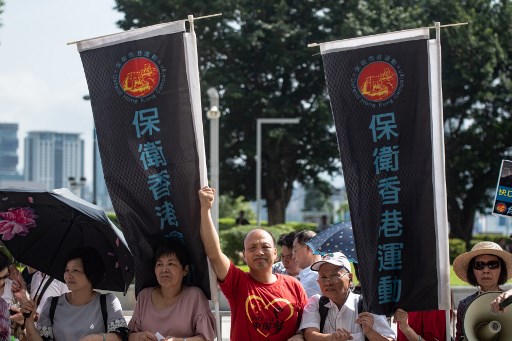Hong Kong raises jail threshold for proposed extradition law

A group of pro-Beijing protesters chant slogans outside the Legislative council during the discussions on extradition laws in Hong Kong on May 14, 2019. AFP
HONG KONG, China – Hong Kong’s government on Thursday made more concessions to a controversial proposed extradition law for mainland China, saying only those wanted for crimes facing at least a seven-year jail sentence would be handed over.
The city’s pro-Beijing authorities are pushing a bill through the legislature which would allow case-by-case extraditions to any jurisdiction it doesn’t already have a treaty with – including mainland China.
Historically the city has baulked at mainland extraditions because of the opacity of China’s criminal justice system and its liberal use of the death penalty.
The extradition plan has sparked huge protests and mounting alarm within Hong Kong’s business and legal communities – as well as foreign governments – who fear it will hurt the semi-autonomous financial hub’s international appeal.
Faced with a growing criticism both domestically and abroad – and angry debates in the city’s parliament – the city’s security chief has unveiled a series of tweaks to the proposed law.
John Lee told a press conference Thursday that rather than allowing extraditions for crimes which carry a maximum three years of imprisonment, the threshold will be raised to at least seven.
Lee said also that the government will only consider extradition requests from other countries made through their top authority.
For mainland China, this meant the request would have to come from the Supreme People’s Procuratorate – the top agency for prosecution and investigation.
He also said amendments will be made to ensure that defendants have an open trial, access to lawyers, be free from forced confession, enjoy the right to appeal, and be given time to prepare a proper defense.
It is not the first concession the government has made on the bill.
In March it agreed to remove nine economic crimes from a total of 46 on the proposed extradition bill after pressure from the local business sector.
Economic crimes are often used by China to pursue critics.
While the government hoped those amendments would make the bill more palatable, critics said the removal of economic crimes clearly showed even the Hong Kong government did not fully trust China’s legal system.
Next Tuesday protesters will gather to mark the 30th anniversary of the Tiananmen crackdown, and crowds are expected to be especially large this year — partially because of anger over the extradition proposals. /ee